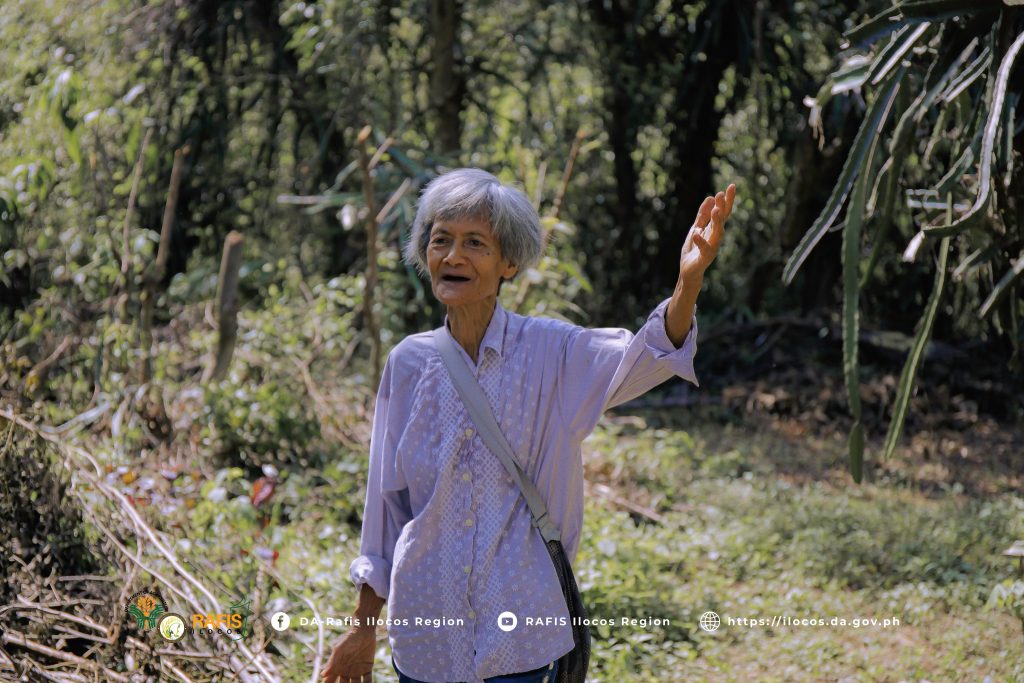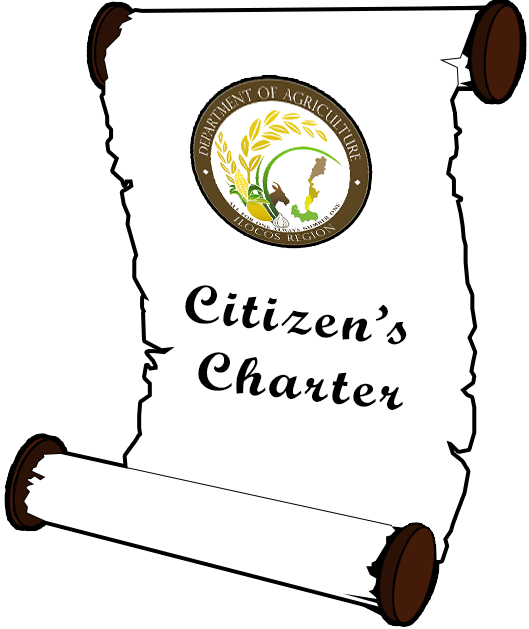
Upon knowing that we will be visiting your farm, to be completely honest, I immediately thought of the fictional character from Disney’s Little Mermaid. The Agriculture Office representative mentioned that you were living alone in this mountainous part of the city, and I keep thinking that you might have similarities to the Ursula I knew of—the villain. Perhaps, you were lonely, grumpy, and somewhat difficult to communicate with.
Upon reaching your lair filled with huge treesᅳsome of which I couldn’t even nameᅳvarious crops, seeds, livestock, and some cobwebs, the ambiance somewhat felt eerie. Would you be like the one I’ve been picturing in my mind? An evil sea witch? I mused.
But meeting you at first sight, I already knew I was wrong.
You were a woman of smiles. With those sparkling round eyes and a cheerful voice, you warmly welcomed every one of us. Those lines in your face seemed to tell a story of someone who often expressed gratefulness and awe. You were also a great storyteller.
The complete opposite of the Ursula, I thought of and known by many.
𝙆𝙣𝙤𝙬𝙞𝙣𝙜 𝙐𝙧𝙨𝙪𝙡𝙖
In her productive years, Ursula worked in Bahrain as a maid, and simultaneously served as a tutor to a rich family’s house not until the Gulf war happened in 1990-1991. “Bumabagsak ang mga missiles doon,” she recalled.
She had wanted to go home during that period, but as life was immensely difficult for Overseas Filipino Workers back then, her employer wouldn’t let her go unless she financed her own plane ticket going home. Left with no other choice but to endure, Ursula stayed until her contract ended in November 1991.
But three years after going home, a stroke hit her. “Akala ko mamatay na ako. Binigyan ako ng Diyos ng pagkakataon para mabuhay muli,” she shared. “Halos three decades na.”
This experience made her appreciate the beauty of life, which is evident in how she handled her farm, she fondly calls Arwana Mountville. A fish and a mountain. Water and land. In Ursula’s own words was a juxtaposition of two words bearing different elements but in farming, both are needed in order for plants to thrive.
“Kaya iyon binabalik ko lang sa nature at sa Diyos ang pagpapala na iyon. Lahat ng gawin mo ay blessed by God. Pag nabless yan ni God lahat ng imposible nagagawa mo na ng posible. Ayun ang tumatak sa isip ko,” Ursula shared.
“Either tao, hayop, halaman, lahat ng aruga at pagmamahal ay ibigay mo. Kasi kung maibigay mo iyong unconditional love, ‘di ka mamimili, walang boundaries. Lahat parang biyaya o parang pinagpapala,” she said further.
𝙏𝙝𝙚 𝙗𝙚𝙖𝙪𝙩𝙮 𝙤𝙛 𝙡𝙞𝙛𝙚
Immensely impacted with a near death experience, it was through farming in which Ursula devoted her time and effort.
Ursula built a tiny house on her 2.6-hectare Arwana Mountville property in the year 2000. Despite having little experience in farming, she began a small backyard farm covering an area of 10 to 20 square meters.
But developing Arwana Mountville also came with its own setbacks. It was filled with fallen dried leaves, weeds, and shrubs. “Ang kapal ng nagdecay na mga leaves kaya pag-apak ng paa mo, andaming langgam na itim at abuhos. Ang hirap idevelop itong area na ito,” said Ursula.
The initial harvests weren’t as bountiful as the hard work Ursula had put into developing her farm. Her two small rice areas produced only two sacks of rice, relying solely on rainwater. However, that didn’t bother her. She continued to expand her farm and added more crops such as papaya, squash, cassava, pole sitaw, patani, and native ampalaya, among others.
“So kung umikot ka lang sa paligid, andiyan na ang saluyot. Andiyan na ang rabong,” Ursula continued. It was a farm filled with vegetables needed for a pinakbet dish.
The farm’s improvement was slow-paced until her older brother offered help. Some parts of the property were bulldozed so that they could plant peanuts, additional vegetables, winged beans, dragon fruit, yams, herbs, and more.
Arwana Mountville became Ursula’s sustainable food source. A nutritious diet wasn’t a problem for her as she prepared meals using everything that was available on her farmstead. She chose a path she described as a life free from toxins and the toxicity that came with urban living.
“Noong nasa baba ako, lahat bibilhin mo kaya kailangan meron kang trabaho o ibang pagkukunan ng pera. Pero kapag nasa bundok ka, malaya ang hangin. Ang ganda ng sikat ng araw,” she shared. “Ang gandang mamasyal. Doon parang pakiramdam mo ang lusog lusog ng iyong katawan.”
In time for her much-needed recovery from a stroke, Arwana Mountville became Ursula’s place for healing. It became a witness, and at the same time, proof of her determination to see what more she could do with whatever she had, despite her physical limitations.
“Almost 30 years na since nastroke ako pero buhay pa din kasi organic iyong kinakain ko. Kahit na may limitations ako, namaintain ko iyong kalusugan ko, at nakakapagtrabaho,” she added.
𝙅𝙤𝙞𝙣𝙞𝙣𝙜 𝙩𝙝𝙚 𝙤𝙧𝙜𝙖𝙣𝙞𝙘 𝙘𝙤𝙤𝙥𝙚𝙧𝙖𝙩𝙞𝙫𝙚
In 2018, Ursula joined the City of San Fernando Organic Cooperative through the help of the city government’s Organic Agriculture focal person, Ms. Josefina Sacnit. This step paved the way for her to increase her knowledge on organic farming. “Lalong dumami iyong kaalaman ko sa organic farming, kahit na sa umpisa pa lang ay iyon na ang pinapraktis ko,” she explained.
In her own organic farming practice, she learned that planting a variety of crops is necessary. In one area, she cultivates sitaw, kalabasa, saluyot, patani, sweet potato, java ginseng, and alugbati. And in other parts, there are various kinds of chili, in different shapes and sizes.
Ursula also noted that doing your own research as a farmer is a must. “Subukan mo ding tingnan kung ano ang angkop na itatanim mo. Kasi hindi lahat dito pwede mong itanim.”
Know what to plant depending on the season. Ursula emphasized that, even in farming, timing is very important. “Kapag tag-ulan, magtanim ng nangangailangan ng tubig. Sa summer na mas konti ang tubig, mag-aadjust ka din. Parang sa cassava. Hindi nangangailangan ng tubig. Nagtathrive iyan hanggang sa pagdating ng ulan.”
I was taken aback by the depth of Ursula’s stories in organic farming, a subject I might never have appreciated had I not had the chance to visit her.
“Ang pole sitaw, twice a year na pwede magtanim and magharvest. Depende sa climate kasi nagbabago na din. So parang iyong sili. Kapag mainit na, nangungulubot iyong mga dahon kaya naglalagay ako ng net. Kaso kulang. Kaya nagtanim din ako ng cassava sa tabi niya. Parang lilim niya,” she continued to explain.
During the dry season, she uses Java ginseng and sweet potato as cover crops to maintain soil moisture.
“Kapag hands-on ka pala sa pagtatanim, doon ka matututo. Kasi iyong theory na tinuturo doon sa trainings, hindi lahat ma-iaaply mo. Kailangan mo imodify. Kailangan mo gumawa ng konting deviation para magthrive ang halaman mo,” she shared.
At present, Ursula is among the other Participatory Guarantee System (PGS) certified organic farmers in the City of San Fernando, La Union. Others include Manuel Acosta of Ibit’s farm, Jameson Quines of James 578 farm, Florence Mendoza of Florence farm, and Randy Jubilo of Jubilo’s farm.
But more than just being organically certified, it is her purest intention of helping people consume safe food that kept her zealous about her natural farming methods.
“Gusto kung mapromote iyong organic food supply. Kaya nga maraming nagkakasakit dahil sa chemicals na ginagamit. If you go healthy, go natural, go organic. Siguradong hahaba ang buhay ng tao. Tapos ang food supply, mas sustainable,” said Ursula. “I-aim po natin na madami ang pagkain na sariwa at healthy.”
Such a mindset has inspired great admiration in me for Ursula and her generosity. To farm and share with people, a life-giving gift instead of poison. And in everything she does, she does it with the intention of simply giving back everything in grateful appreciation for what she considers her blessing, her second life.
